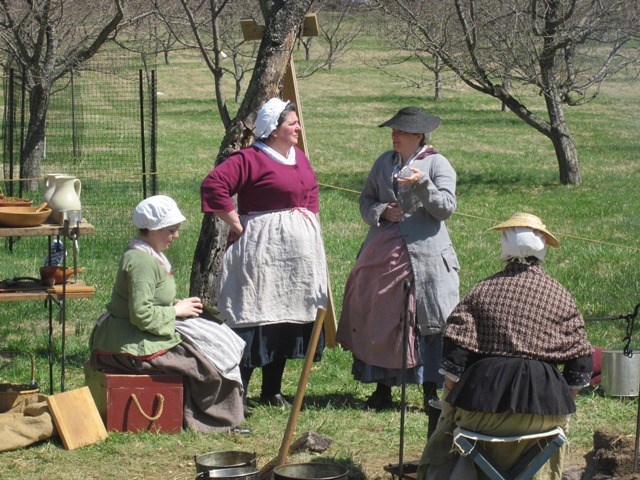Mrs. John Smith and Ann Smith"John Smith and wife from camp recommended by Captain. Child Ann born Jan. 12, 1780."
- from the baptismal records of the Presbyterian Church, Morristown New Jersey Mrs. William Garr and Sarah Garr"William Garr a soldier and wife – child Sarah born Jan. 27, 1780."
-from the baptismal records of the Presbyterian Church, Morristown New Jersey It is very difficult to find specific information about the women that shared the hardships of army life with their soldier/husbands. Thanks to the record of baptisms kept at the Presbyterian Church in Morristown we have some names of actual military families that probably lived in the army camp in Jockey Hollow. Unfortunately, we have no other information about these specific families, but it confirms that fact that women and children were part of the Jockey Hollow encampment 
NPS The Women of the CampAt the time of the American Revolution, the extreme hardships of a soldier made military life to be generally considered for men only. But there were women and children who traveled with the army and suffered the same hardships, even those of the "Hard Winter" of the Morristown 1779-80 encampment.
The women who lived and worked among the troops were generally called "women of the camp." These were typically wives of soldiers who, for whatever reason, were not able to provide for themselves or their families the necessities of life. They were therefore forced to follow their soldier-husbands, due to poverty, or the failure of their farm. Some were refugees, due to enemy occupation of their homestead. Having women and children follow the army was discouraged by the leaders of the American military. The Continental Army found it difficult enough to feed the fighting men, let alone any extra people. In August of 1777, when General Washington needed the army to move quickly, he stated that
But as the war continued, members of the army realized the benefits of women in the camp. During the Morristown encampment of 1779-80, the Pennsylvania government complained to the officers of the regiments from that state about the "evil…of generally indulging soldier’s wives in drawing rations." In his reply by letter, General Edward Hand stressed that, while abuses should be corrected, the army should not withhold from "deserving" women "that degree of support which necessities oblige them to sollicit (sic) and which in many instances the services of their sons, husbands or fathers give them a kind of title to demand from the public." He mentions their usefulness "in cooking, washing & mending, attending to the sick &c" and so advocates that "a number of women of good character proportioned to that of the men in each company be allowed to draw rations in each reg(imen)t. (General Edward Hand to Joseph Reed, President of the Supreme Executive Council of Pennsylvania, March 19, 1780.)
Some women of the camp demonstrated great bravery, attempting to assist troops during actual combat conditions, such as women of the 6th Pennsylvania Regiment who took empty soldiers’ canteens and returned to the scene of battle with filled ones during the most intense fighting during the Battle of Brandywine, although warned repeatedly concerning getting near the line of fire. For More Information:Nancy K. Loane Following The Drum: Women at the Valley Forge Encampment (Potomac Books, Washington DC, 2009)To view a C-Span lecture by Dr. Loane, click here. Alfred F. Young. Masquerade: The Life and Times of Deborah Sampson, Continental Soldier (New York, 2004) For an interview with the author, click here. John U. Rees “The multitude of women …" An Examination of the Numbers of Female Camp Followers by With the Continental Army: http://www.revwar75.com/library/rees/wnumb1.htm or click here. "Searching for Molly Pitcher" http://www.visitmonmouth.com/archives/splevnt.asp or click here. Osborn 1837 pension application excerpt http://historymatters.gmu.edu/d/5833/ or click here. For information on Sampson, click here. |
Last updated: December 11, 2021
